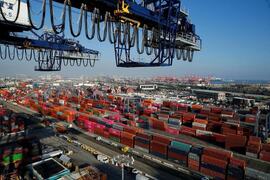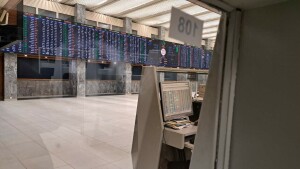Japan said Thursday its trade surplus shrank 7.0 percent in 2006, declining for a second straight year as China takes over the mantle of the world's top exporter of manufactured goods.
However, the surplus grew in December, the second straight monthly increase, as the appetite in the United States for Japanese cars remained robust, officials and analysts said. The fall for 2006 was mainly due to the high cost of oil as energy imports offset exports of cars and semiconductors, the finance ministry said in a preliminary report.
Japan's trade surplus came to 8.09 trillion yen (66.8 billion dollars) in 2006, the second year it came below China which posted a record 177.47 billion dollar surplus. "China is taking over the place of Japan as the sender of manufacturing products to the world, notably the United States," said Junichi Makino, an economist at Daiwa Institute of Research. "The trend is likely to continue for now," Makino said.
But Japan has also taken advantage of its neighbour's breakneck growth, stepping up exports to China of high-tech goods such as semiconductors. Japan said its trade deficit with China contracted for the first time in three years in 2006, shrinking 5.2 percent to 2.98 trillion yen.
China has emerged as Japan's biggest trading partner, in large part as Japanese companies use its vast labour pool as a manufacturing base for the crucial US market.
Japan's total exports rose 14.6 percent last year to 75.25 trillion yen in 2006, the fifth straight annual gain, but imports grew much faster, jumping 17.9 percent to 67.16 trillion yen, the fourth consecutive increase. The yen's decline may have helped exports. The dollar averaged 116.25 yen last year, compared with 109.64 in 2005.
The surplus with the United States kept rising. Japan's positive balance expanded by 16.8 percent to 9.03 trillion yen - the second largest on record. Japan benefitted from a record 16.94 trillion yen in exports to the US, including fuel-efficient cars, which have proven a major hit in the North American market.
The surplus with the European Union jumped 24.1 percent to 3.95 trillion yen, the first gain in two years. Despite the slump in 2006, Japan's trade surplus grew 22.8 percent in December from a year earlier to 1.12 trillion yen, the second straight year-on-year gain as exports rose 9.8 percent to 6.96 trillion yen and imports put on 7.6 percent to 5.84 trillion yen.
The market had been expecting a slightly higher surplus of 1.175 trillion but the figure came within the range of forecasts and had little impact on the market, dealers said. Analysts said the surplus would likely continue to pick up as oil prices are easing. Resource-poor Japan is almost entirely dependent on Middle Eastern imports for oil.
The trade surplus may have ups and downs "but it is expected to show a gradual rise considering lower crude oil prices," said Norio Miyagawa, economist at Shinko Research Institute.
BR100
15,115
Increased By
28.1 (0.19%)
BR30
43,048
Increased By
175.6 (0.41%)
KSE100
149,493
Increased By
257.8 (0.17%)
KSE30
45,518
Increased By
11.6 (0.03%)























Comments
Comments are closed.